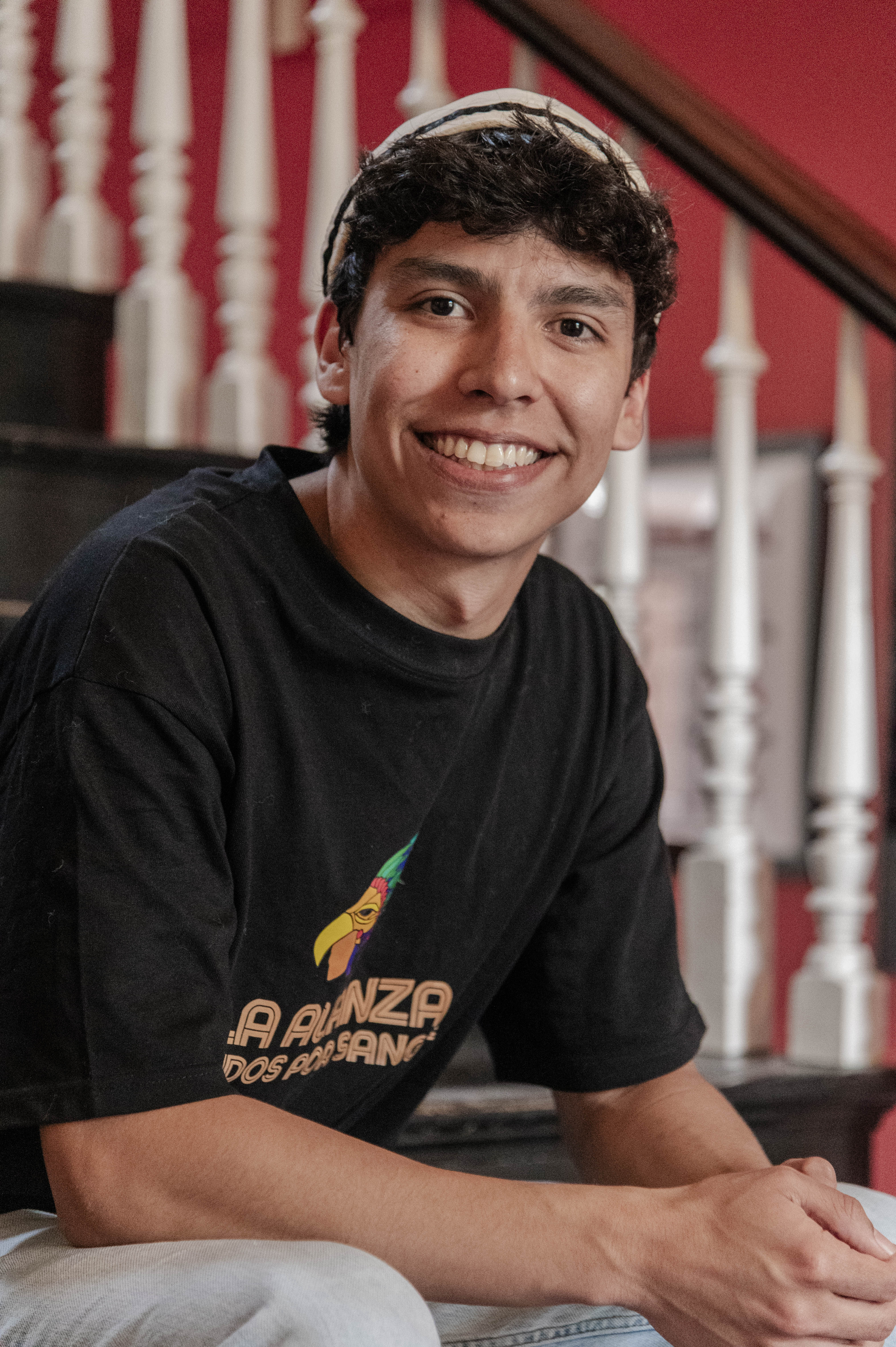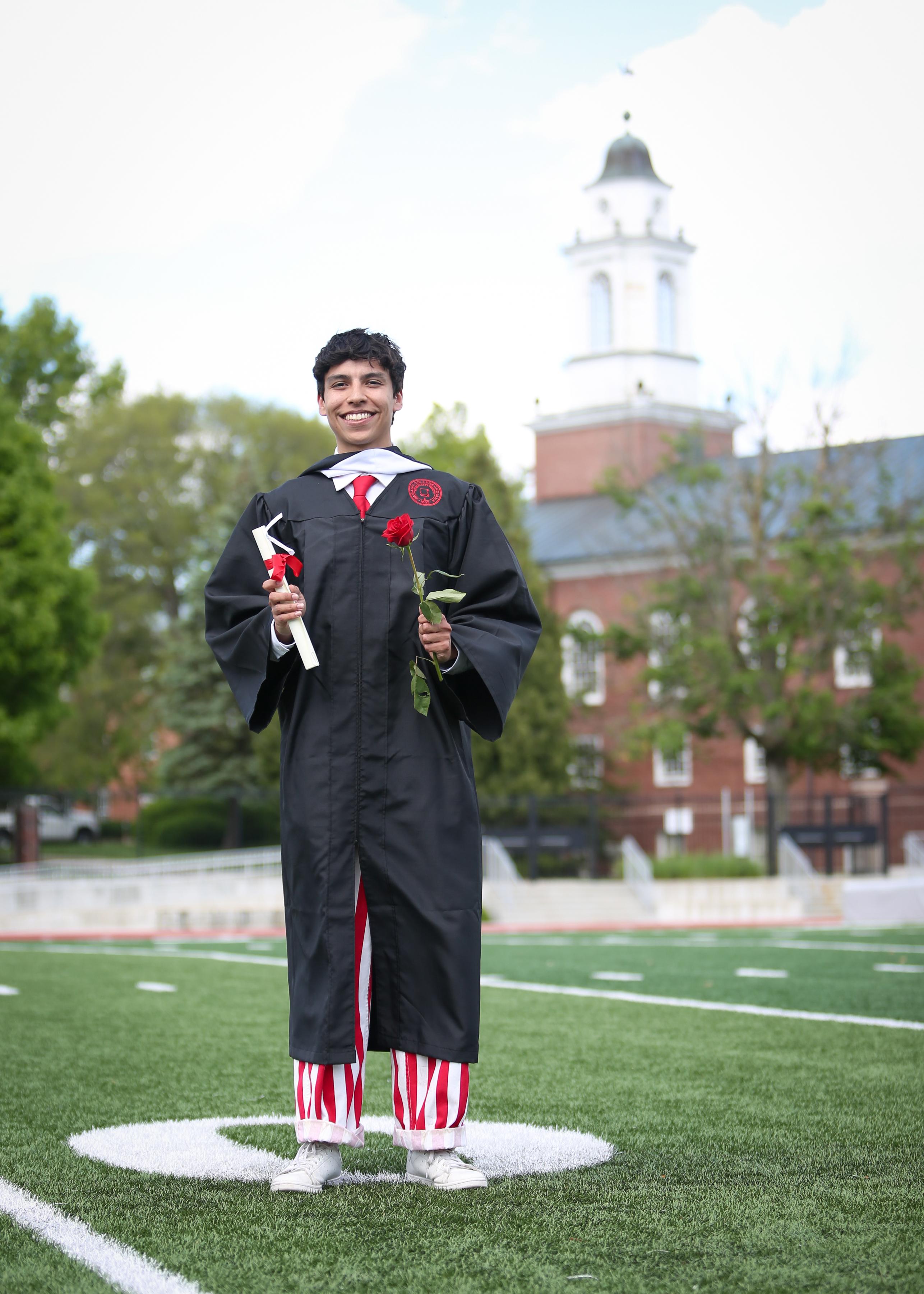Benjamin Sampsell says he couldn’t have imagined that a cultural club he would help bring back to life freshman year would ultimately grow into one of the largest groups on campus. Thanks to his leadership and dedication to the celebration of Hispanic/Latino culture, that’s exactly what happened with La Alianza at Wabash.
“It’s honestly mind blowing and inspiring,” said Sampsell, a 2024 graduate. “Seeing La Alianza grow into what it is today—knowing future Latino freshmen will arrive to campus and find a group ready to welcome them as family—is one of my proudest accomplishments.”

Moving from San Cristobal de las Casas, Chiapas, Mexico, to Crawfordsville, Indiana, Sampsell remembers arriving during the COVID-19 pandemic with an uncertainty about the future and where he fit in.
“I had never really been aware of myself as being someone different,” said the political science major and philosophy minor. “My friends in Mexico didn’t relate to me just solely based on the fact that I have darker skin or spoke Spanish.
“But when I came here, a lot of my day-to-day interactions involved questions like, do you speak Spanish or where are you from,” Sampsell explained. “Hearing those questions was hard and made me question what parts of me people were seeing.”
Sampsell had been told that there was a Latino organization at Wabash he could join called Unidos Por Sangre (meaning bonded by blood), but when he officially arrived to campus, he discovered the student club was inactive.
Six months into his freshman year, Sampsell said he felt like having an organization on campus that embraced and empowered Hispanic/Latino students, promoted racial equity, and provided a safe space was needed.
“Something was clearly missing—kind of a Malcolm X Institute of Black Studies (MXIBS) equivalent of strength for Latino students at Wabash,” Sampsell said. “Creating a new club just felt right.”
Along with some of his peers, Sampsell reimaged Unidos Por Sangre and renamed the organization La Alianza (meaning the alliance).
Adriel Trott, philosophy professor and Andrew T. and Anne Ford Chair in the Liberal Arts, said she admired Sampsell’s drive to create a more welcoming community for all students.
“Ben was that kind of student who had a strong sense of what was important to him and what he cared about,” she said. “He wanted to do things at Wabash that mattered to him and to bring other students along to change and improve campus for the better.”
Creating a student club was challenging, Sampsell explained. It took a lot of time, patience, and hard work of the founding members to organize.
“We really didn’t know what we were doing,” he said. “We first went back to Unidos Por Sangre alumni to get the history and figure out what the club was supposed to be. We learned that it existed, went dormant, existed, went dormant, again and again over the years as guys graduated.
“At first that was discouraging, but as we had more conversations with alumni, they encouraged us to really revitalize and create something new that we would be proud of,” Sampsell continued. “That sparked confidence. From there, momentum in membership grew exponentially. People jumped on board and wanted to be a part of the brotherhood.”
As membership grew over the years, so has La Alianza’s impact and involvement with the community both on and off campus.
La Alianza has independently hosted and partnered with the MXIBS, ’shOUT, and other clubs to co-host numerous educational and philanthropic events throughout the school year that are designed to promote diversity, equity, and inclusion (DEI).
Club leaders have also prioritized connecting with the surrounding Hispanic community. Many students have volunteered or worked in local schools, health clinics, and businesses, offering a range of services like tutoring and translating.
“I am so proud of the advocacy and love that the club has for community service,” Sampsell said.
Thanks to a $25 million grant from Lilly Endowment Inc. as part of its College and Community Collaboration (CCC) initiative, La Alianza will soon have a permanent space to call home.
A Latino Community Center is being renovated adjacent to the main corner of campus. In addition to being La Alianza’s headquarters, the space will be used to host English Language Learning (ELL) programs for native Spanish speakers. Wabash will also help immigrant families navigate the often-confusing path to higher education.
“A big part of what makes this so special is the fact that we are creating a space for the Crawfordsville community to also call home,” Sampsell said. “Part of how I got through my first year here was taking lots of trips to El Charro and Little Mexico. Not only did I get great food, but the owners and families of the restaurants were my Latino community that I missed so much back at home. Being able to give back to those people with these Wabash resources is great.”
In addition to serving as co-founder and vice president of La Alianza, Sampsell distinguished himself at Wabash through a variety of other campus leadership roles and academic achievement.
He was a member of Delta Tau Delta, Phi Beta Kappa, Wabash Liberal Arts Immersion Program (WLAIP), and the Sphinx Club. He served as the vice president of the student body, president of the International Student Association, and as a student ambassador at the Athens Democracy Forum. He worked as a research assistant, a Wabash Democracy and Public Discourse (WDPD) fellow, and as a peer career advisor at Career Services.
Jill Lamberton, English professor and special assistant to the president for diversity, equity, and inclusion, remembers Sampsell’s first year on campus.
“Even with experiencing COVID and the cultural shock, Ben came in with so much energy,” Lamberton said. “From the start, you could just tell that he was going to go on to do big things.”
One of Lamberton’s favorite memories of Sampsell was watching him lead La Alianza’s first Dia De Los Muertos celebration. The event featured food, a campus wide Altar de Muertos, and an explanation by Sampsell on the meaning and history behind the Mexican holiday honoring loved ones who have died.
“His presentation was so smart and well-researched,” she said. “I was impressed by the level of preparation and thoughtfulness he put into educating our community on something that means so much to him and his culture. That intellectual curiosity, attention to detail, and rigor is part of the legacy that Ben leaves.”
Trott said Sampsell’s interest in philosophy also stood out during his time on campus. He always came to class well prepared, organized, and eager to dive deeper into discussions with his classmates on the materials being studied.

“Even though he was a student himself, he modeled for other students how to learn,” said Trott, who taught Sampsell in four philosophy courses. “He was capable of grasping difficult concepts, making connections between concepts, applying them to the world, and articulating his position clearly and convincingly.”
This summer, Sampsell is attending the Philosophy in an Inclusive Key Summer Institute at the Rock Ethics Institute at Penn State University Park, which Trott said involved a competitive application process.
“PIKSI-Rock is all-expenses paid week-long program bringing students from underrepresented areas in philosophy together to read, discuss, and meet distinguished philosophers,” said Trott. “The philosophy department is very proud of him!”
Sampsell said he hopes to be remembered as a someone who helped shape Wabash for the better for future generations of Latino students.
“I don’t really care if people remember my name, but I hope they remember what we (founding members) did with La Alianza and that they continue to support los hermanos (the brothers),” Sampsell said. “I’m confident that will happen—that La Alianza will outlast us for years to come.”